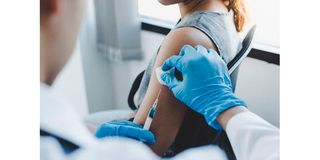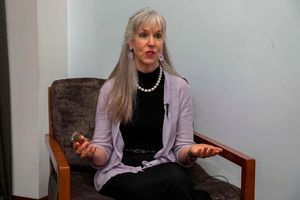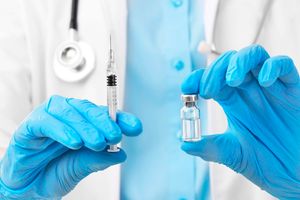Scientists find single-dose HPV vaccine efficacious at 98pc after Kenyan trials

Researchers from the Kenya Medical Research Institute (Kemri) and Massachusetts General Hospital (MGH) say they have found that a single dose of HPV vaccine is highly efficacious at 98 per cent over three years.
Researchers from the Kenya Medical Research Institute (Kemri) and Massachusetts General Hospital (MGH) say they have found that a single dose of HPV vaccine is highly efficacious at 98 per cent over three years.
While announcing new results from the KEN SHE study conducted in Kenya at the at the 35th International Papillomavirus Conference in Washington D.C on Wednesday evening, they said that they had found the vaccine to be highly efficacious in preventing persistent infections of the virus after a randomized, multicenter, double-blind controlled trial.
The trial included 2,275 Kenyan women between the ages of 15-20 who were randomly assigned to receive either a single dose of the bivalent or nonavalent HPV vaccine or the control vaccine.
“Over the 36-month study period, participants were regularly tested for HPV DNA, with cervical and vaginal swabs collected at regular intervals. The results showed that the single dose of both the bivalent and nonavalent HPV vaccines were highly efficacious, with a vaccine efficacy of 98 per cent. Additionally, the nonavalent vaccine had a vaccine efficacy of 96 per cent for the nine types of HPV it targets, “ they said in an official announcement.
"We believe that these findings could have significant implications for vaccination programs in low-resource settings, where the burden of cervical cancer is highest," said lead Kemri lead investigator Dr Nelly Mugo.
Significant implications
The researchers added that the study's findings have significant implications for the prevention of cervical cancer which is caused by persistent HPV infections.
“A single-dose vaccination schedule could simplify implementation and decrease costs associated with multi-dose vaccination schedules, making it a more feasible option for low-resource settings. At present, only 33 per cent of the targeted population of girls are receiving the first HPV dose and 16 per cent returning for the 2nd dose in Kenya,” they noted.
“These low first dose and even lower second dose uptake rates are duplicated throughout Africa. Unfortunately, of the estimated 342,000 cervical cancer deaths in 2020, more than 90% occurred in low- and middle-income countries.“
This is why the experts are of the view that a single-dose vaccination schedule could therefore go a long way in addressing this deadly inequity.
"This study provides important evidence that a single dose of HPV vaccine can be highly effective in preventing persistent infections, and ultimately, cervical cancer," the Lead Investigator Dr Ruanne Barnabas of the Massachusetts General Hospital said.
The lead investigator said of the estimated 342,000 cervical cancer deaths in 2020, more than 90 per cent occurred in low- and middle-income countries.
“Following the WHO recommendation, the support of a one-dose regimen for HPV vaccine could help make the vaccine more accessible to women and girls around the world by lowering costs, alleviating pressure on supply, and making the vaccine easier to deliver,” Peter Dull, the deputy director for clinical vaccine development at the Bill & Melinda Gates Foundation said.
The new developments come at a time when since December 2022, eight countries have announced they will switch to a one-dose HPV schedule which has traditionally required 2-3 doses—following updated guidance from the WHO.
Vaccine durability
It’s important to note that part of the hesitancy has been regarding the durability of the single-dose HPV vaccine.
“From our initial 18-month data, there have been concerns raised regarding the durability of the single-dose HPV vaccine. This 36-month data helps to allay this anxiety, we encourage health ministers particularly those in low and middle-income countries, to consider the findings of the KEN SHE Study and to work towards increasing access to the HPV vaccine, including the single dose option where appropriate,” Dr Maricianah Onono, the KENSHE country director said.
The researchers further emphasised that their ultimate goal is to prevent cervical cancer and improve women's health.
This is why they believe that the HPV vaccine, whether administered as a single dose or the full two-dose schedule, can be an important tool in achieving that goal.
While highlighting the next steps for Kenya and Africa, Kemri Director General Professor Elijah Songok described the achievement as a revolution.
“The KEN SHE Study's findings have the potential to revolutionize HPV vaccination programs around the world. The evidence that a single dose of both the bivalent and nonavalent HPV vaccines are highly efficacious in preventing persistent infections is a breakthrough and we hope that the success of this study will encourage further investment in cervical cancer prevention and vaccination programs, and ultimately lead to a reduction in the burden of this devastating disease.”





